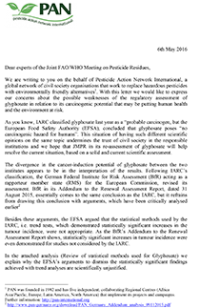6th May 2016
Dear experts of the Joint FAO/WHO Meeting on Pesticide Residues,
We are writing to you on the behalf of Pesticide Action Network International, a global network of civil society organisations that work to replace hazardous pesticides with environmentally friendly alternatives[1]. With this letter we would like to express our concerns about the possible weaknesses of the regulatory assessment of glyphosate in relation to its carcinogenic potential that may be putting human health and the environment at risk.
As you know, IARC classified glyphosate last year as a “probable carcinogen, but the European Food Safety Authority (EFSA), concluded that glyphosate poses “no carcinogenic hazard for humans”. This situation of having such different scientific opinions on the same topic undermines the trust of civil society in the responsible institutions and we hope that JMPR in its re-assessment of glyphosate will help resolve the current situation, based on a solid and current scientific assessment.
The divergence in the cancer-induction potential of glyphosate between the two institutes appears to be in the interpretation of the results. Following IARC’s classification, the German Federal Institute for Risk Assessment (BfR) acting as a rapporteur member state (RMS) for the European Commission, revised its assessment. BfR in its Addendum to the Renewal Assessment Report, dated 31 August 2015, essentially comes to the same conclusion as the IARC, but it refrains from drawing this conclusion with arguments, which have been critically analysed earlier[2]
Besides these arguments, the EFSA argued that the statistical methods used by the IARC, i.e. trend tests, which demonstrated statistically significant increases in the tumour incidence, were not appropriate. As the BfR’s Addendum to the Renewal Assessment Report shows, statistically significant increases in tumour incidence were even demonstrated for studies not considered by the IARC.
In the attached analysis (Review of statistical methods used for Glyphosate) we explain why the EFSA’s arguments to dismiss the statistically significant findings achieved with trend analyses are scientifically unjustified.
Furthermore, by using a weight of evidence approach EFSA dismissed 3 case studies from 3 different countries reporting significant increases in non-Hodgkins lymphoma following exposure to glyphosate-based products based on the cohort Agricultural Health Study (AHS) in the U.S. However, this cohort study only followed the incidents of cancers for a short period of time (from 1993 to 2001) and therefore the results may be an underestimation. Please find attached Prof. Eberhard Greiser’s work expressing his concerns on why the positive results of epidemiology studies should be taken into account.
Finally, we would like to address our concerns about the significant scientific evidence of the genotoxic potential (DNA damage and oxidative stress) of both glyphosate and glyphosate-based products from in-vitro and in-vivo studies. The European Authorities concluded: “In the absence of sufficient evidence for a carcinogenic risk related to the intended herbicidal uses the mechanistic and other studies do not provide further evidence for a carcinogenic mechanism.” Nevertheless, if we take into account the positive statistical significant results of the trend test in mammals as in the mice experiments and the 4 independent epidemiology studies (3 case studies and a meta-analysis), the evidence on mechanisms of genotoxicity cannot be ignored.
We hope you take into consideration our concerns related to glyphosate exposure and revise with scrutiny the safety of this chemical with the overall aim to protect human health, the environment and the future generations.
Yours sincerely,
Chair of PAN International
[1] PAN was founded in 1982 and has five independent, collaborating Regional Centres (Africa Asia/Pacific, Europe, Latin America, North America) that implement its projects and campaigns. Further information: http://pan-international.org
[2] http://www.pan-germany.org/download/PAN_Germany_Addendum_analysis_091120...
